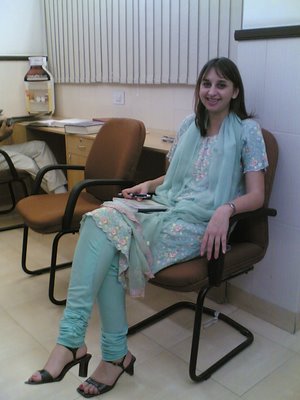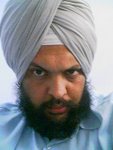
Dr. Zoe Selhi was here some days ago and wrote some pretty complimentary stuff about our health care system and the residents in PGIMER. Considering that the latter is so rare given our constant state of somnolence, sloth and gluttony; this is high praise indeed.
I am posting it all unchanged because as I always say, its wonderful to read something written by someone who thinks in English unlike most of us.
Keep in touch, Zoe.
India Trip 2006-By Zoë Selhi
I have been interested in mental health for many years and in fact my interest in psychiatry was the main reason for applying to medical school. As a senior medical student studying in New York, I had an opportunity to do an elective in any field of medicine and in any part of the world. I decided that I wanted some kind of international experience in the mental health field, where I would be able to see the treatment of those with mentally illness in another country and get a better understanding of how psychiatric disorders are viewed and defined somewhere other than North America. I chose to come to India, my second trip here. Although my father resides in Canada, he is from a Sikh family originally from Faridkot and many of his siblings reside in India. I came to the Postgraduate Institute in Chandigarh for several different reasons, the first one being that PGIMER is known for academic excellence in the teaching and training of residents from every field of medicine including psychiatry. I also knew that the teaching would be in English. Other reasons for coming to PGI were that I was able to stay comfortably with several relatives in a city that I had become familial with during my last trip. This decision turned out to be a good one.
Initially I had thought that the treatment of the mentally ill in India would be a little more archaic or perhaps “less developed” than what I had come to know in North America. I tried to prepare myself for what I thought might be considered slightly “inhumane” in the West. Yet, I was pleasantly surprised. I find there is a great deal of humanity here in India towards psychiatric patients. The social support network of the family is probably the most visible difference compared to more developed countries. The family unit has an enormous role in caring for their mentally ill family member and they are much more amenable to taking on this role than their Western counterparts. This is most apparent on the ward where family members stay with the patient, and are involved in everything from feeding and dressing their sick family member to attending ward rounds and learning how to implement behavioral therapies. In the West, family members have a set time that they can visit, and self care is directed primarily by the nursing staff. In place of the family in North America are social support groups, counselors and social workers to offer individual support to patients. There are also case workers that help find suitable housing for people living with mental illness, because the ultimate goal of someone with a psychiatric illness is to live in the community on their own and perhaps become employed. Although I knew that these factors were different between the East and West before arriving in India, being able to see this first hand was probably the largest teaching point I had here and it has helped me to understand the idea of how integral the role of families is in other parts of the world. This will be important for my understanding of mental health in the future as I begin to care for immigrants from other countries in the West.
There are other differences in India. One is the role of the doctor-patient relationship. For example, physicians in India have a great deal of power over the patient and patients are often much more likely to take advice from their doctors as compared to the West. In fact, compliance issues may be better here. It also seems rare for people to come in on their own for any treatment of mental disturbances, it is usually the decision of the family to bring the patient in. Relationships between the physician and the family are established; there is not a focus on the individual patient like there is in the West. In fact, it is not uncommon for the doctor to speak primarily to a family member about the patient, while the patient listens. In India it seems like the focus is on the family and how the individual members function within the family unit as compared to the West where the focus is on the individual.
In addition, I started to wonder about whether Westernized instruments for psychiatric assessment could really be applied to a culture that is so vastly different from the developed countries. I think that validating tools based on an Indian population would prove beneficial in mental health here.
The role of the psychiatrist is also different in India. The psychiatrist is heavily involved in many aspects of patient care, taking on the role of the social workers, nursing staff and psychology at times. In North America, there are more defined roles for psychiatrists and they play a largely supervisory role in the care of the patient. There are many more health professionals in the West and each play a distinct role. Psychiatrists in India also seem to be very knowledgeable in a wide variety of disciplines including internal medicine, neurology, and development. Training is comprehensive and broad. In North America, physicians generally tend to be slightly more narrowly defined yet have expertise in their fields of interest. Although it is possible that this may translate into gaps in diagnosis and perhaps proper treatment in North America, the reasons for this include insurance issues and malpractice suits, especially in the US.
These were just a few of the differences I found between the East and the West. I think there are plenty more as I was limited with the language, but I learned a lot even without the use of a common language in psychiatry. I had a wonderful time at PGI and learned much more that any textbook could have given me. I’m glad I came and will be taking back some fond memories and lessons from my trip, as well as some great photos!








1 comment:
The health care system in America is on the skids, and I told my children to send me to India if I need any major surgery or long term care. Thanks for you post. It was very interesting.
MJ
Post a Comment